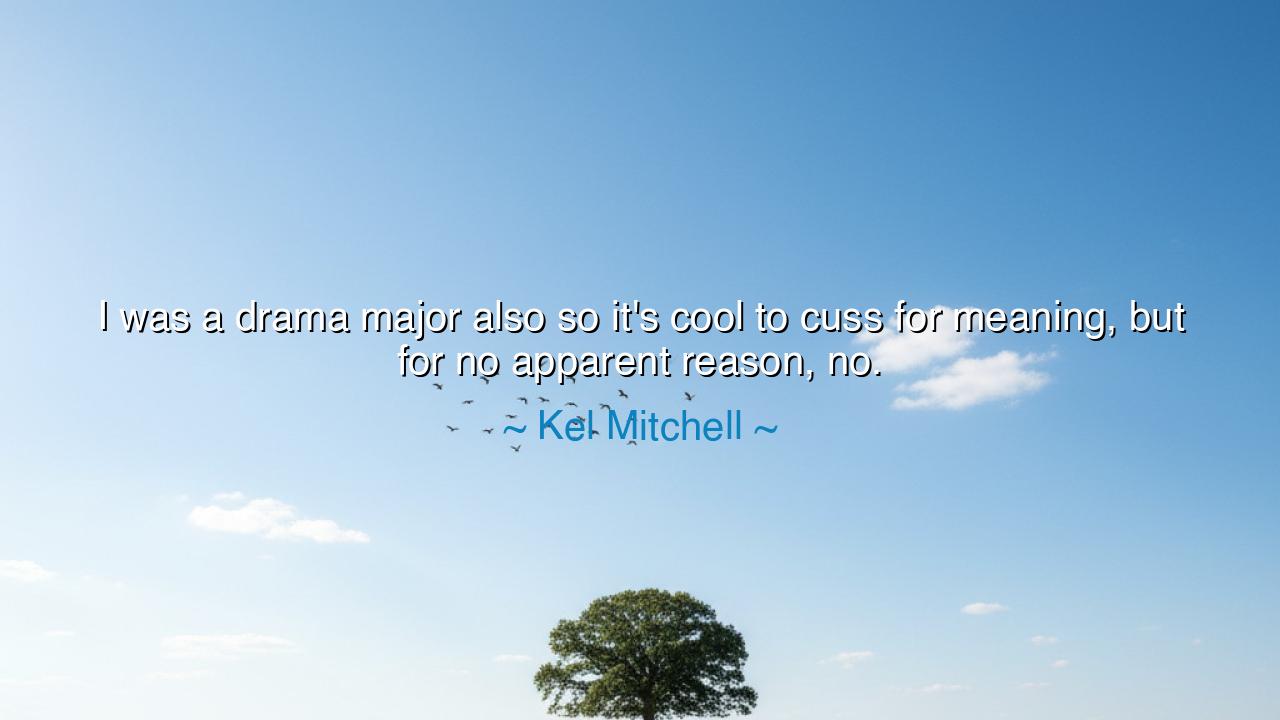
I was a drama major also so it's cool to cuss for meaning, but
I was a drama major also so it's cool to cuss for meaning, but for no apparent reason, no.






In the great history of human expression, there has always been a profound understanding of the power that words carry. Whether spoken in anger, joy, or melancholy, words are not mere symbols—they are tools of transformation, capable of shaping minds and changing the course of events. Kel Mitchell’s words, “I was a drama major also so it's cool to cuss for meaning, but for no apparent reason, no,” speak to this ancient truth: the value of language is not found in its reckless use, but in its purposeful application. The ancients understood that words must be chosen carefully, for they carry the weight of meaning, and their improper use can lead to unnecessary chaos.
In ancient Greece, the art of rhetoric was revered. Aristotle taught that the ethos, pathos, and logos of speech—the character of the speaker, the emotional appeal, and the logic of the argument—must be carefully balanced to persuade or move an audience. Words, in the hands of the skilled orator, could sway nations, ignite revolutions, or bring about peace. But when used without thought, when they become mere tools of chaos, they lose their power and degrade the speaker. In this sense, Mitchell’s recognition that cussing should only be done when it serves a greater purpose aligns with the ancient wisdom: language is most powerful when it is intentional, when it serves a meaningful purpose, not when it is used carelessly.
Consider the great orators of ancient Rome, like Cicero, whose mastery of language was legendary. Cicero understood that the effectiveness of speech lies not in excessive force, but in precision. He would never have used the sharpness of words without reason; instead, he crafted his speeches to stir the emotions of his audience, to appeal to their reason, and to lead them toward a purposeful action. In the same vein, Mitchell’s statement echoes the ancient principle that language must be wielded with care—each word must have purpose, and only when words are used thoughtfully do they have the power to make a true impact.
In literature, the use of profanity or harsh language is often seen as a tool for expressing the depth of emotion. Consider the tragic plays of Sophocles or Euripides, where characters, driven to despair, sometimes use strong words to convey their suffering. Yet these words were earned through the emotional intensity of the moment; they were not used recklessly, but with deep purpose. The ancients did not shy away from strong language, but they understood that it must be used in moments where it enhances meaning and adds depth to the experience, not when it is employed for shock value or without regard for its true weight.
The lesson we learn from Mitchell’s words is profound: the power of language lies not in its excess, but in its purposeful use. Just as the great poets, orators, and philosophers of the past knew, words have the ability to shape the future, to build or destroy, to heal or hurt. The reckless use of language diminishes its impact and can strip it of its true potential. Cussing, when used thoughtfully, can evoke a strong emotion or emphasize a point, but when used carelessly, it becomes a distractor, diluting the meaning and failing to achieve the desired effect.
In your own life, consider how you use your words. Do you speak with intention, or are your words impulsive and unthoughtful? Take a moment to reflect on the impact your words have on others and the world around you. Just as the ancient philosophers and orators carefully selected their words to make a lasting impression, so too should we. Speak not to impress, but to express truth and share meaning. Let your words carry the weight of thoughtfulness, for it is in this careful selection of language that we truly engage with the world and shape it for the better.
By following the wisdom of the ancients, we can create lives full of purpose and meaning, where every word has its place and every conversation contributes to the greater good. Like Mitchell, let us use words not recklessly, but with awareness, intention, and a deep respect for their power.






AAdministratorAdministrator
Welcome, honored guests. Please leave a comment, we will respond soon